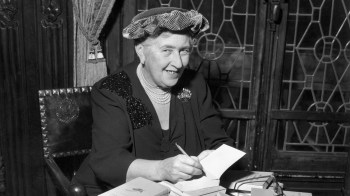“What are the novels about monetary policy?” asks Tyler Cowen of Marginal Revolution. He’s responding to a piece by Ezra Klein of the Washington Post. Klein, in turn, is reacting to a post by Mathew Yglesias of Think Progress. Klein has a few thoughts.
There’s “The Wonderful Wizard of Oz,” which some believe to be an allegory for the debate over the gold standard. If you’re willing to include novels about the effects of monetary policy, pretty much any novel about the Great Depression counts, and “The Grapes of Wrath” is particularly eloquent on the subject. But is there anything more on-topic than that?
Cowen adds his picks. Among them:
I am reminded of Paul Cantor on Thomas Mann on hyperinflation. Specialists may wish to consult Friedrich Achberger, “Die Inflation und die zeitgenossische Literatur,” in Aufbruch und Untergang: Osterreichische Kulturzwischen 1918-1938, Franz Kadrnoska, ed. (Vienna: Europa, 1981), pp. 29-42; there are monetary policy themes in Musil, Zweig, and Broch, among others. Hans Fallada too.
Yglesias weighs in, too. He suggests the early fiction of Neal Stephenson, such as Interface, Snow Crash, and the short story, Great Simolean Caper.
The key thematic elements are preoccupation with debt and hyperinflation in a way that I think is misguided in the present day but made sense in the early 1990s milieu.
I love this stuff. And now I want to read Stephenson.
But the exchange got me wondering, what are gripping novels about personal finance? The list is long, at least compared to novels that deal with monetary policy. Still, my favorite personal finance novel is probably* David Copperfield *by Charles Dickens. After all, the kindly but debt-ridden Mr. Wilkins Micawber advised a young David Copperfield, “Annual income twenty pounds, annual expenditure nineteen nineteen six, result happiness. Annual income twenty pounds, annual expenditure twenty pounds ought and six, result misery.”
Sadly, Dickens knew what he was writing about since his father had been sent to the debtor’s prison. Those may be the most famous sentences in literature dealing with personal finance.
A realistic appraisal of money is a powerful theme with Jane Austen, especially in novels like Pride and Prejudice. You can learn a lot about the power of dividend payments off capital from her stories, especially during a long period of relative price stability and low interest rates. .
I could go on, but I’m curious: What are your favorite personal finance novels?
There’s a lot happening in the world. Through it all, Marketplace is here for you.
You rely on Marketplace to break down the world’s events and tell you how it affects you in a fact-based, approachable way. We rely on your financial support to keep making that possible.
Your donation today powers the independent journalism that you rely on. For just $5/month, you can help sustain Marketplace so we can keep reporting on the things that matter to you.


















